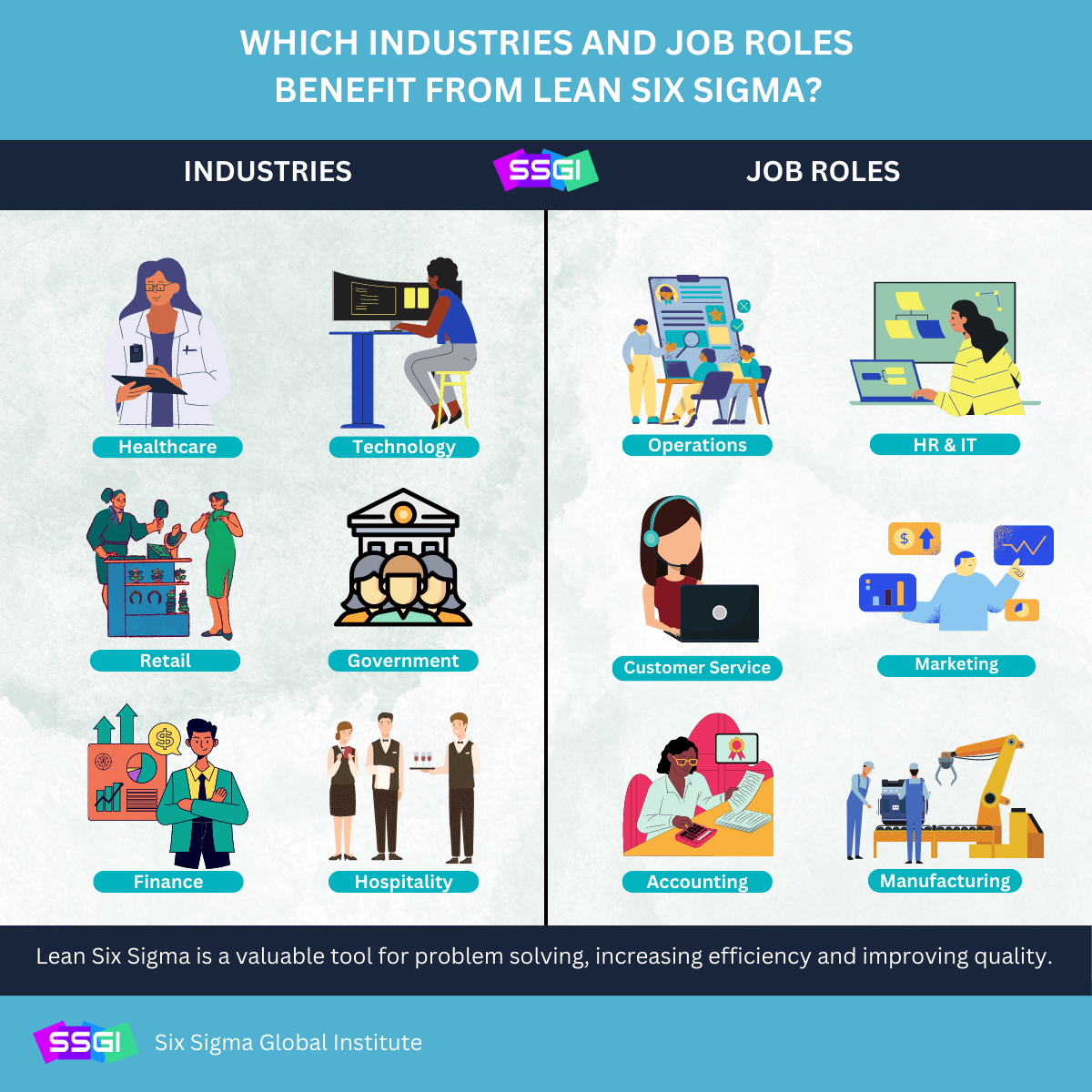Which Industries Benefit from Lean Six Sigma?
Lean Six Sigma is a business management strategy that combines the Lean methodology, which focuses on maximizing value and minimizing waste, with the Six Sigma methodology, which focuses on reducing defects and improving quality. It is used in many industries, including:
- Manufacturing
- Healthcare
- IT
- Financial services
- Retail and e-commerce
- Hospitality
- Government and public sector
- Construction and Engineering
The goal of Lean Six Sigma is to increase efficiency, reduce costs, and improve customer satisfaction. Thus, any industry, organization or job function that has problems to solve, will benefit from using Lean Six Sigma.

Job Functions That Benefit From Using Lean Six Sigma
In organizations that adopt Lean Six Sigma, there are several job roles and functions associated with its implementation and use:
- Lean Six Sigma Black Belt: A highly trained professional who leads and manages Lean Six Sigma projects and provides training and mentorship to Green Belts.
- Lean Six Sigma Green Belt: A trained professional who leads and participates in Lean Six Sigma projects and provides support to Black Belts.
- Master Black Belt: A senior-level executive who provides support, resources, and leadership to Lean Six Sigma initiatives.
- Process Owner: A person responsible for a specific business process who works with Lean Six Sigma teams to identify and eliminate waste and improve process efficiency.
- Data Analyst: A person who uses statistical analysis and data interpretation to identify areas for improvement in processes and make informed decisions.
- Project Manager: A person responsible for managing Lean Six Sigma projects, including defining project goals, developing project plans, and tracking progress.
- Trainer: A person responsible for providing training and education on Lean Six Sigma methodologies and tools.
The specific job roles and functions may vary depending on the organization and the specific implementation of Lean Six Sigma. These roles require a combination of technical and soft skills, including problem-solving, communication, and project management.
Learn more about Lean Six Sigma Job Roles and Salaries.
Industries that use Lean Six Sigma
Lean Six Sigma in Manufacturing
 In the manufacturing industry, Lean Six Sigma is used to streamline processes, eliminate waste, and reduce defects. It helps to optimize production and supply chain operations, increase efficiency, and improve product quality. The following are some common applications of Lean Six Sigma in manufacturing:
In the manufacturing industry, Lean Six Sigma is used to streamline processes, eliminate waste, and reduce defects. It helps to optimize production and supply chain operations, increase efficiency, and improve product quality. The following are some common applications of Lean Six Sigma in manufacturing:
- Process improvement: Lean Six Sigma can be used to identify and eliminate inefficiencies in production processes.
- Inventory management: It can help to reduce inventory levels, increase accuracy, and reduce waste.
- Quality control: Six Sigma methodologies can be used to measure and reduce defects, improve product quality, and increase customer satisfaction.
- Cost reduction: Lean Six Sigma helps to reduce costs by identifying and eliminating waste, improving process efficiency, and reducing defects.
- Capacity utilization: It can help to increase capacity utilization by optimizing processes and reducing waste.
By implementing Lean Six Sigma in manufacturing, organizations can improve their competitiveness, reduce costs, and increase customer satisfaction.
lean six sigma in Financial services
 In the financial services industry, Lean Six Sigma is used to streamline processes, reduce costs, and improve customer satisfaction. It can be applied to various areas such as:
In the financial services industry, Lean Six Sigma is used to streamline processes, reduce costs, and improve customer satisfaction. It can be applied to various areas such as:
- Operations: Lean Six Sigma can be used to improve efficiency and reduce waste in the operations of banks, insurance companies, and other financial institutions.
- Risk management: It can help to minimize risks in financial operations by reducing errors and improving process quality.
- Customer service: Lean Six Sigma can help financial institutions to improve their customer service by reducing wait times, improving accuracy, and reducing customer complaints.
- Compliance: It can help to ensure compliance with regulatory requirements by improving processes and reducing the risk of errors.
- Data analysis: Six Sigma methodologies can be used to analyze and interpret large data sets to make more informed decisions.
By using Lean Six Sigma in financial services, organizations can increase efficiency, reduce costs, and improve customer satisfaction. This can help to increase competitiveness and profitability in a highly competitive market.
lean six sigma in IT
 In the IT industry, Lean Six Sigma is used to improve processes and reduce waste, particularly in software development, support, and maintenance. It can be applied in the following areas:
In the IT industry, Lean Six Sigma is used to improve processes and reduce waste, particularly in software development, support, and maintenance. It can be applied in the following areas:
- Software development: Lean Six Sigma can help to reduce defects, improve quality, and speed up development times in the software development process.
- IT service management: It can help to improve the quality and efficiency of IT service management processes, such as incident response and problem resolution.
- Project management: Lean Six Sigma can help to improve project management processes by reducing waste, increasing efficiency, and reducing the risk of project delays.
- Data management: Six Sigma methodologies can be used to analyze and manage large data sets to improve decision-making and reduce errors.
- Infrastructure management: It can help to optimize infrastructure management processes and reduce waste in areas such as network management, server administration, and storage management.
By using Lean Six Sigma in IT, organizations can improve efficiency, reduce costs, and improve customer satisfaction. This can help to increase competitiveness and profitability in a highly competitive industry.
lean six sigma in Healthcare
 In the healthcare industry, Lean Six Sigma is used to improve processes, reduce waste, and increase patient satisfaction. It can be applied in the following areas:
In the healthcare industry, Lean Six Sigma is used to improve processes, reduce waste, and increase patient satisfaction. It can be applied in the following areas:
- Patient care: Lean Six Sigma can help to improve the quality and efficiency of patient care processes, such as medical diagnoses, treatments, and procedures.
- Clinical operations: It can help to optimize clinical operations by reducing waste, improving efficiency, and reducing the risk of medical errors.
- Supply chain management: Lean Six Sigma can help to improve the efficiency of supply chain management processes, such as procurement and inventory management.
- Revenue cycle management: It can help to improve the accuracy and efficiency of revenue cycle management processes, such as billing and payment processing.
- Patient safety: Six Sigma methodologies can be used to reduce medical errors and improve patient safety by analyzing data and improving processes.
By using Lean Six Sigma in healthcare, organizations can improve the quality of patient care, increase efficiency, and reduce costs. This can help to increase competitiveness and profitability in a highly regulated industry.
Check out the SSGI Lean Six Sigma Healthcare Certification programs: Healthcare Yellow Belt, Healthcare Green Belt, Lean Healthcare (CLHP).
lean six sigma in Retail and e-commerce
 In Retail and e-commerce, Lean Six Sigma is used to improve processes, reduce costs, and increase customer satisfaction. It can be applied in the following areas:
In Retail and e-commerce, Lean Six Sigma is used to improve processes, reduce costs, and increase customer satisfaction. It can be applied in the following areas:
- Supply chain management: Lean Six Sigma can help to improve the efficiency of supply chain management processes, such as procurement and inventory management.
- Order fulfillment: It can help to improve the accuracy and speed of order fulfillment processes, reducing the risk of errors and increasing customer satisfaction.
- Customer service: Lean Six Sigma can help to improve the quality and efficiency of customer service processes, reducing wait times and improving accuracy.
- Data analysis: Six Sigma methodologies can be used to analyze data to make more informed decisions and improve processes.
Lean Six Sigma in Government and Public Sector
 In the Government and public sector, Lean Six Sigma is used to improve processes, reduce waste, and increase efficiency. It can be applied in the following areas:
In the Government and public sector, Lean Six Sigma is used to improve processes, reduce waste, and increase efficiency. It can be applied in the following areas:
- Procurement: Lean Six Sigma can help to improve the efficiency of procurement processes, reducing costs and increasing accuracy.
- Service delivery: It can help to improve the quality and efficiency of service delivery processes, such as licensing, permitting, and case management.
- Financial management: Lean Six Sigma can help to improve financial management processes, reducing waste and improving accuracy.
Lean Six Sigma in Construction and Engineering
 In Construction and Engineering, Lean Six Sigma is used to improve processes, reduce waste, and increase efficiency. It can be applied in the following areas:
In Construction and Engineering, Lean Six Sigma is used to improve processes, reduce waste, and increase efficiency. It can be applied in the following areas:
- Project management: Lean Six Sigma can help to improve project management processes, reducing waste and increasing efficiency.
- Design and planning: It can help to improve the accuracy and efficiency of design and planning processes, reducing the risk of errors and delays.
- Construction: Lean Six Sigma can help to improve construction processes, reducing waste and improving efficiency.
Lean Six Sigma Certification for all Industries
Get Certified and Stand Out!
Lean Six Sigma Certification is a validation of an individual’s knowledge and expertise in Lean Six Sigma principles and methodologies. Lean Six Sigma combines two different approaches to quality management: Lean and Six Sigma, which aim to improve process efficiency and reduce defects.
Getting certified in Lean Six Sigma can help you stand out in the job market, enhance your career prospects, and increase your earning potential.
There are several types of Lean Six Sigma Certifications available, including:
Lean Six Sigma Master Black Belt
The Lean Six Sigma certification you choose should depend on your specific career goals and experience level. If you are new to Lean Six Sigma, you may want to start with a Yellow or Green Belt certification. If you have some experience in Lean Six Sigma, you may want to pursue a Black Belt certification. A Master Black Belt certification is for individuals who are experts in Lean Six Sigma and can lead large-scale projects.
Check Out Our Specialized Lean Six Sigma Career Tracks
Designed to teach you everything you need to know, so you can transform your career and become a Lean Six Sigma Professional.
Lean Six Sigma Career Tracks Available In: LSSP-I, LSSP-II & LSSHP



